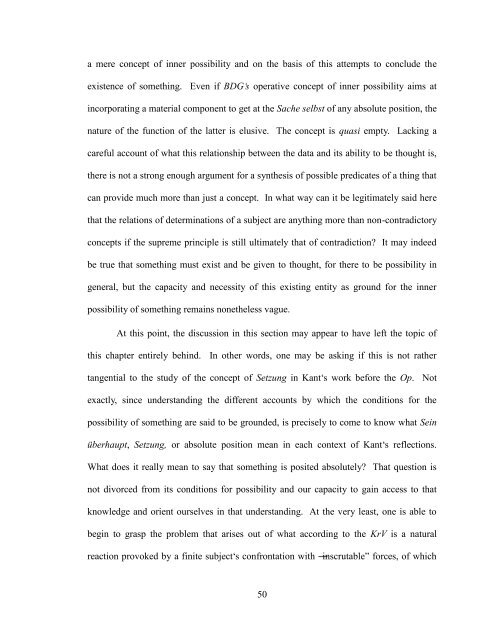The Doctrine of Self-positing and Receptivity in Kant's Late ...
The Doctrine of Self-positing and Receptivity in Kant's Late ...
The Doctrine of Self-positing and Receptivity in Kant's Late ...
You also want an ePaper? Increase the reach of your titles
YUMPU automatically turns print PDFs into web optimized ePapers that Google loves.
a mere concept <strong>of</strong> <strong>in</strong>ner possibility <strong>and</strong> on the basis <strong>of</strong> this attempts to conclude the<br />
existence <strong>of</strong> someth<strong>in</strong>g. Even if BDG‘s operative concept <strong>of</strong> <strong>in</strong>ner possibility aims at<br />
<strong>in</strong>corporat<strong>in</strong>g a material component to get at the Sache selbst <strong>of</strong> any absolute position, the<br />
nature <strong>of</strong> the function <strong>of</strong> the latter is elusive. <strong>The</strong> concept is quasi empty. Lack<strong>in</strong>g a<br />
careful account <strong>of</strong> what this relationship between the data <strong>and</strong> its ability to be thought is,<br />
there is not a strong enough argument for a synthesis <strong>of</strong> possible predicates <strong>of</strong> a th<strong>in</strong>g that<br />
can provide much more than just a concept. In what way can it be legitimately said here<br />
that the relations <strong>of</strong> determ<strong>in</strong>ations <strong>of</strong> a subject are anyth<strong>in</strong>g more than non-contradictory<br />
concepts if the supreme pr<strong>in</strong>ciple is still ultimately that <strong>of</strong> contradiction? It may <strong>in</strong>deed<br />
be true that someth<strong>in</strong>g must exist <strong>and</strong> be given to thought, for there to be possibility <strong>in</strong><br />
general, but the capacity <strong>and</strong> necessity <strong>of</strong> this exist<strong>in</strong>g entity as ground for the <strong>in</strong>ner<br />
possibility <strong>of</strong> someth<strong>in</strong>g rema<strong>in</strong>s nonetheless vague.<br />
At this po<strong>in</strong>t, the discussion <strong>in</strong> this section may appear to have left the topic <strong>of</strong><br />
this chapter entirely beh<strong>in</strong>d. In other words, one may be ask<strong>in</strong>g if this is not rather<br />
tangential to the study <strong>of</strong> the concept <strong>of</strong> Setzung <strong>in</strong> Kant‘s work before the Op. Not<br />
exactly, s<strong>in</strong>ce underst<strong>and</strong><strong>in</strong>g the different accounts by which the conditions for the<br />
possibility <strong>of</strong> someth<strong>in</strong>g are said to be grounded, is precisely to come to know what Se<strong>in</strong><br />
überhaupt, Setzung, or absolute position mean <strong>in</strong> each context <strong>of</strong> Kant‘s reflections.<br />
What does it really mean to say that someth<strong>in</strong>g is posited absolutely? That question is<br />
not divorced from its conditions for possibility <strong>and</strong> our capacity to ga<strong>in</strong> access to that<br />
knowledge <strong>and</strong> orient ourselves <strong>in</strong> that underst<strong>and</strong><strong>in</strong>g. At the very least, one is able to<br />
beg<strong>in</strong> to grasp the problem that arises out <strong>of</strong> what accord<strong>in</strong>g to the KrV is a natural<br />
reaction provoked by a f<strong>in</strong>ite subject‘s confrontation with ―<strong>in</strong>scrutable‖ forces, <strong>of</strong> which<br />
50


